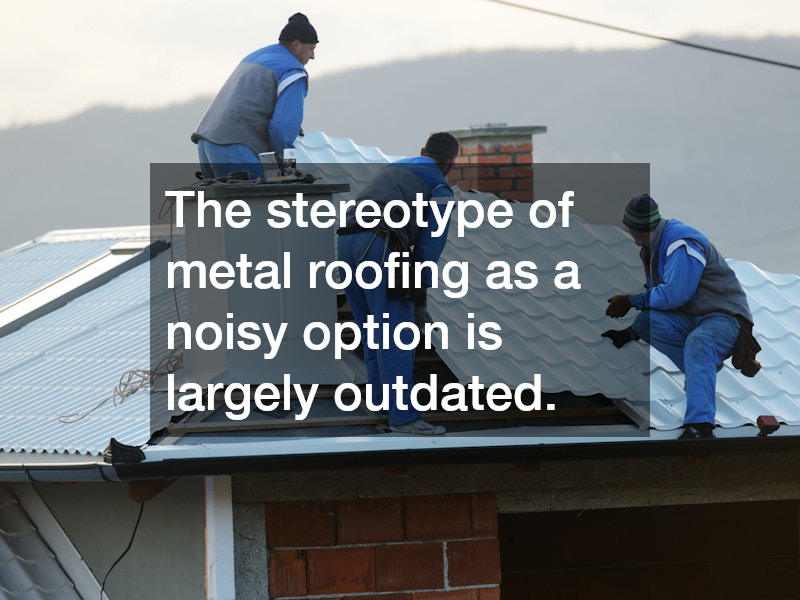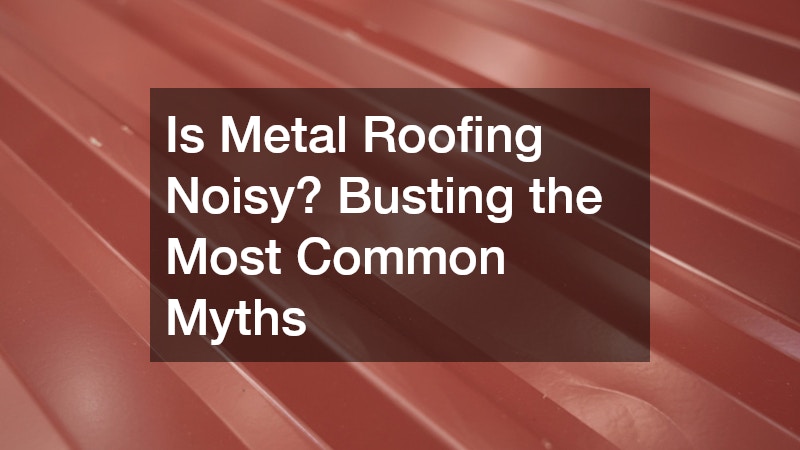When it comes to home improvement and construction, roofing options have evolved tremendously. Among the array of choices, metal roofing stands out for its durability and aesthetic appeal. However, despite its growing popularity, there are a number of misconceptions surrounding metal roofing, with noise being one of the primary myths.
This article aims to delve into whether metal roofing is truly noisy and bust the most common myths associated with it.
Understanding Metal Roofing and Noise
One of the most persistent myths is that metal roofing is excessively noisy, especially during rainstorms. This myth likely originates from older generations of metal roofs that lacked sophisticated installation techniques and materials. Modern metal roofing, however, incorporates technological advancements that significantly reduce noise levels.
A prevalent assumption is that metal sheets amplify the sound of rain and hail, creating a cacophony inside the house. In reality, the noise level of a well-installed metal roof is comparable to that of traditional roofing materials like asphalt shingles. Enhanced insulation and underlayment systems dampen the sound, proving metal roofing to be less noisy than assumed.
The structure and installation process are crucial in determining the noise level of metal roofing. Modern metal roofing systems often include solid sheathing, which acts as a noise barrier. This additional layer prevents sound waves from penetrating through the roof, reducing indoor noise significantly.
Mitigating Noise in Metal Roofing
Metal roofing materials have advanced, offering solutions tailored to reduce noise. High-quality metal panels manufactured today come with textured surfaces that disrupt sound waves, preventing them from passing through. The result is a quieter indoor environment compared to what homeowners might expect.
Installation techniques also play a pivotal role in ensuring the quietness of metal roofing. Professional roofers use sound-deadening methods such as adding insulation or using specialized fastening techniques. These techniques help in significantly minimizing the noise that might otherwise be associated with metal roofing.
Additionally, metal roofing is often installed over an existing roof layer, acting as an extra noise buffer. The multi-layered approach not only enhances the roof’s durability but also aids in decreasing noise levels. Consequently, these layered systems have dispelled much of the noise-related myths surrounding metal roofing.
Comparing Metal Roofing to Traditional Roofing Materials
To fully understand the noise perspective, it is essential to compare metal roofing to other traditional materials. Asphalt shingles, tiles, and wood may offer different aesthetic appeals but often fall behind in terms of longevity and noise reduction capabilities. While some believe that metal roofs amplify sound more than these materials, studies and customer feedback often reveal otherwise.
The echoes inside a home under a metal roof are no louder than those under shingled roofs. In fact, homes with metal roofs paired with proper underlayment report similar to lower noise levels. The misconception often lies not in the material itself but in how it is perceived compared to conventional options.
Moreover, the rise in popularity of metal roofing options stems partly from their ability to blend durability with modern acoustic solutions. Homeowners are often pleasantly surprised by how quiet their homes remain during a storm. It challenges the notion that switching from shingles to metal roofing compromises peace within the household.
Breaking Down the Myths
Understanding the source of the noise can help debunk myths about metal roofing being noisy. Generally, what homeowners hear during rainfall is the sound bouncing off the roof structure, and with advancements, modern metal roofs have minimized this impact. The perception of noise is often exaggerated due to lack of exposure to modern roofing systems.
Furthermore, the advancement in building technologies means that contemporary metal roofs often outperform older models in sound-testing against other materials. Additionally, reports from across the housing sector have shown higher satisfaction rates regarding noise levels in homes equipped with metal roofing. This illustrates an impressive shift in perception as technology improves.
In terms of sound quality, today’s metal roofing systems deliver a performance that rivals its competitors. Homeowners looking for a technologically advanced roofing solution that also offers peace of mind will find metal roofing to surpass expectations. The myth of metal roofing being noisy becomes more myth than fact upon closer examination.
The stereotype of metal roofing as a noisy option is largely outdated. The evolution of roofing technologies has equipped metal roofs with features that minimize noise, ensuring that homeowners enjoy both the aesthetic and structural benefits without sound disturbances. As the industry continues to innovate, metal roofing will likely become an increasingly attractive option among residential roofing solutions.

